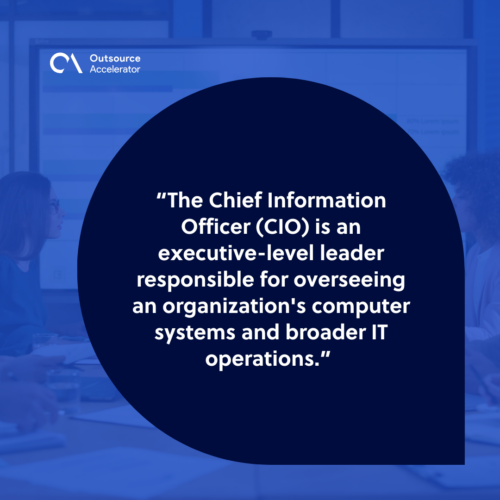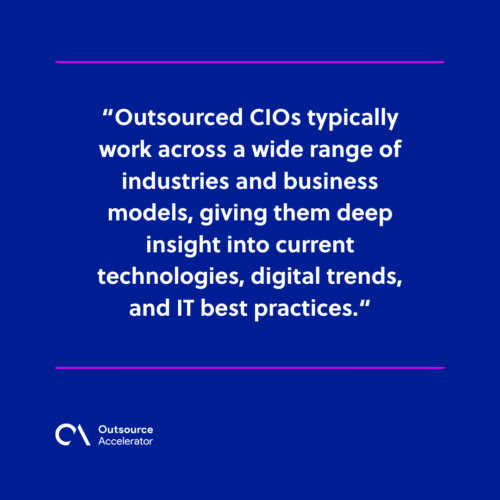Outsourced CIO: Understanding its impacts on your business

With the evolving trends in the global economy, organizations from various industry sectors have no slackening in pace to stay on track using smart and innovative strategies.
Today, most business leaders maximize the use of technology and design a comprehensive digital landscape for their operation with the help of Information technology (IT) professionals.
According to Statista, IT services earned approximately $1.42 trillion in revenue in 2024, ranking it the second-highest earning industry segment.
Among the most sought-after services in this digital transformation is the guidance of an outsourced Chief Information Officer (CIO), who ensures that a company’s technology investments are aligned with its broader business goals.
This article will let you learn more about the roles and impacts of an outsourced CIO in recalibrating your business.
What does an outsourced CIO do?
The Chief Information Officer (CIO) is an executive-level leader responsible for overseeing an organization’s computer systems and broader IT operations.
This role focuses on the strategic use of technology to enhance the organization’s performance. They also ensure long-term sustainability and keep pace with the fast-evolving digital landscape.
Given the complexity and technical demands of the position, many companies now choose to outsource the CIO role rather than hire an in-house executive—especially as CIO services have become widely available through IT outsourcing firms.
An outsourced CIO handles many of the technology-related responsibilities typically managed by an internal IT team, with service delivery models often categorized by location:
- Onshore IT outsourcing: Partnering with providers located in the same country, allowing for smoother communication and cultural alignment.
- Nearshore IT outsourcing: Working with providers in nearby countries, typically within similar time zones, which helps balance cost-efficiency with collaboration ease.
- Offshore IT outsourcing: Engaging providers in distant countries, often to reduce costs significantly, though it may involve challenges like time zone differences and communication barriers.

What are the requirements and qualifications for a CIO?
Whether in-house or outsourced, a Chief Information Officer (CIO) must possess a strong combination of leadership capabilities and technical expertise.
A CIO is responsible for overseeing IT teams and ensuring the performance, security, and alignment of an organization’s technology systems with its strategic goals.
For companies looking to outsource this role, selecting the right candidate is critical to success.
Below are the typical qualifications and requirements companies should look for in a CIO:
1. Educational background
A CIO candidate usually holds a bachelor’s degree in a relevant field such as computer science, information technology, or management information systems.
While not always required, many professionals pursue a master’s degree—often in business administration (MBA) or information systems—to deepen their technical knowledge and gain a competitive edge for executive-level positions.
2. Professional experience
The CIO role demands extensive experience in the IT industry, particularly in leadership and strategic roles.
Most organizations expect candidates to have at least 10 years of experience in IT, cybersecurity, or related areas, along with 3–5 years in a managerial or executive position.
This background ensures the CIO can handle high-level decision-making and lead digital transformation efforts effectively.
3. Key skills
A CIO oversees the overall business processes to keep on track with the emerging trends in data analytics, technologies, and digital transformation.
However, their role also requires other skills that are vital for them to manage the team effectively. These include:
- Strong leadership and communication abilities
- Strategic thinking and organizational management
- Critical thinking and decision-making skills
- A solid grasp of emerging technologies, data analytics, and cybersecurity practices
Outsourced vs in-house CIO
Organizations may choose between hiring an in-house CIO or outsourcing the role, depending on their budget, operational complexity, and strategic priorities.
Outsourced CIOs offer a more cost-effective solution, particularly for small to mid-sized businesses.
By working remotely or from a co-working space, they eliminate the need for overhead costs such as office space, equipment, and employee benefits.
This arrangement allows companies to access top-tier expertise without the long-term financial commitment of a full-time executive.
In-house CIOs, on the other hand, are fully embedded within the organization. Their direct involvement in day-to-day operations and deeper integration with company culture often enables more nuanced decision-making.
This option is typically favored by larger companies that require constant, on-site leadership and tighter control over internal systems and data security.
In general, small businesses tend to benefit from the flexibility and affordability of outsourcing, while larger enterprises often prioritize the strategic advantage of having a dedicated, in-house CIO.
Benefits of having an outsourced CIO in business technology
Aside from cost-effectiveness, an outsourced CIO can share additional benefits to your business, especially for startups or small businesses with limited capacity to hire a full-time executive position.
Here are some of the benefits that can motivate you to have an outsourced CIO:
1. Expertise and broad experience
Outsourced CIOs typically work across a wide range of industries and business models, giving them deep insight into current technologies, digital trends, and IT best practices.
This broad exposure allows them to bring innovative solutions and fresh perspectives that may be beyond the scope of an in-house team with limited external experience.

2. Independent, objective leadership
Because outsourced CIOs are not tied to internal politics or specific vendors, they can provide unbiased, strategic recommendations that are truly in the best interest of the business.
Their focus is on delivering value and results within the scope of the engagement, helping companies make smart, data-driven decisions without long-term commitments or internal constraints.
3. Strategic planning and team collaboration
An outsourced CIO works closely with internal IT teams to align technology initiatives with broader business goals.
They help define and execute both short-term and long-term strategies, aiming to improve efficiency, scalability, and innovation.
Additionally, they often serve as mentors, coaching internal staff and enhancing the organization’s overall IT leadership capacity.
Elevating business capability with the help of an outsourced CIO
The outsourcing industry has become a game-changer for startups and small to mid-sized businesses (SMBs) looking to grow sustainably with limited resources and lean teams.
Bringing in an outsourced CIO allows businesses to tap into high-level expertise without the financial strain of hiring a full-time executive. It’s a smart way to access strategic leadership while keeping overhead low.
Reputable outsourcing providers carefully vet their talent, ensuring that professionals like CIOs bring deep experience and specialized knowledge to the table.
This gives companies peace of mind, knowing they’re working with proven experts who can make an immediate impact.







 Independent
Independent




